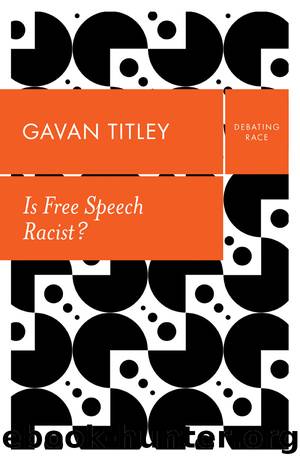Is Free Speech Racist? by Gavan Titley

Author:Gavan Titley
Language: eng
Format: mobi
Tags: Sociology, Social Science, Demography, General
ISBN: 9781509536160
Publisher: Polity
Published: 2020-07-08T23:00:00+00:00
The right to offend
The 2015 attacks in France, Abdellali Hajjat notes, saw the increased circulation of the neologism désolidarisation, a demand for Muslims in France to openly mark their non-solidarity with the stabbers, shooters and bombers. The demand for a collective response imputes collective implication or even guilt, but even more basically, it presumes a collective: âSo-called Muslims constitute a diverse population in terms of social class, nationality and political and ideological leanings, all of which is erased entirely by the call for désolidarisationâ (Hajjat 2017: 81). In the more conspiratorial, identitarian articulation of this call, promoted by Franceâs considerable cast of radical right public intellectuals, anything less proves that Muslims are a âpeople within a peopleâ, bent on the destruction of an integral way of life. In a putatively more progressive iteration, marking non-solidarity demonstrates fidelity with a political way of life now under attack, thus requiring, according to the former Prime Minister Alain Juppé, âthat French Muslims clearly state that they have nothing to do with this fanaticism, this barbarism, that they fully subscribe to the values of the Republicâ (Guénolé 2015).
Juppéâs rhetoric may betray the emotional intensity of the moment, but his basic coordinates locate this demand in a wider politics of integration ascendant over the last fifteen to twenty years in western and northern Europe. Often superficially described as a form of âcivic integrationismâ, varying political projects in this period have pivoted on articulating the value, or at least reality, of lived diversity. This vision of the globalized, post-migration nation de-emphasizes the assumed cohesion of ethnic homogeneity in favour of cultivating a unifying liberal-democratic culture of shared values. This cultivation is not primarily focused on forming a pluralist public sphere where differences can be expressed; rather it is focused on governing public subjectivities and demanding evidence of the active acceptance of âliberal valuesâ as a condition of entry to and contingent membership of the ânational communityâ. The intensity with which gender equality, sexual freedom and free expression have been mobilized as defining of âourâ way of life as against the unsettling alterity of Muslims is a source of potent political confusion: how can it be âracistâ to insist that they integrate, and not threaten democratic life and egalitarian norms?
This tension between progressive rhetoric and coercive practice is less confusing if it is approached, as Elizabeth Povenelli (2011) argues in her discussion of what she terms âlate liberalismâ, as a form of governmentality, or management of population. Late liberalism, in this argument, is shaped through the mid-to-late-twentieth-century âlegitimacy crisisâ generated by anticolonial and new social movementsâ challenge to inequality and ethnicized citizenship. One pronounced response to these challenges has been the reflexive creation of âspaces within liberalismâ for âthe recognition of differenceâ, such as the plethora of initiatives and rhetorical visions often stuffed, inaccurately and exaggeratedly, into the capacious category of âmulticulturalismâ. While, even across significantly divergent iterations in Europe, multiculturalism has very rarely amounted to more than a patchwork of initiatives and semiotic investments, the widely
Download
This site does not store any files on its server. We only index and link to content provided by other sites. Please contact the content providers to delete copyright contents if any and email us, we'll remove relevant links or contents immediately.
| Anthropology | Archaeology |
| Philosophy | Politics & Government |
| Social Sciences | Sociology |
| Women's Studies |
The Leavers by Lisa Ko(6473)
Born to Run: by Christopher McDougall(6260)
iGen by Jean M. Twenge(4702)
Sapiens by Yuval Noah Harari(4537)
The Kite Runner by Khaled Hosseini(4435)
Spare by Prince Harry The Duke of Sussex(4196)
Bullshit Jobs by David Graeber(3180)
Livewired by David Eagleman(3122)
Goodbye Paradise(2963)
Never by Ken Follett(2880)
A Dictionary of Sociology by Unknown(2518)
Harry Potter 4 - Harry Potter and The Goblet of Fire by J.K.Rowling(2416)
The Club by A.L. Brooks(2360)
People of the Earth: An Introduction to World Prehistory by Dr. Brian Fagan & Nadia Durrani(2346)
The Social Psychology of Inequality by Unknown(2311)
Machine Learning at Scale with H2O by Gregory Keys | David Whiting(2291)
Harry Potter and the Order of the Phoenix (5) by J.K. Rowling(2227)
0041152001443424520 .pdf by Unknown(2220)
Don't Sleep, There Are Snakes by Daniel L. Everett(2217)
